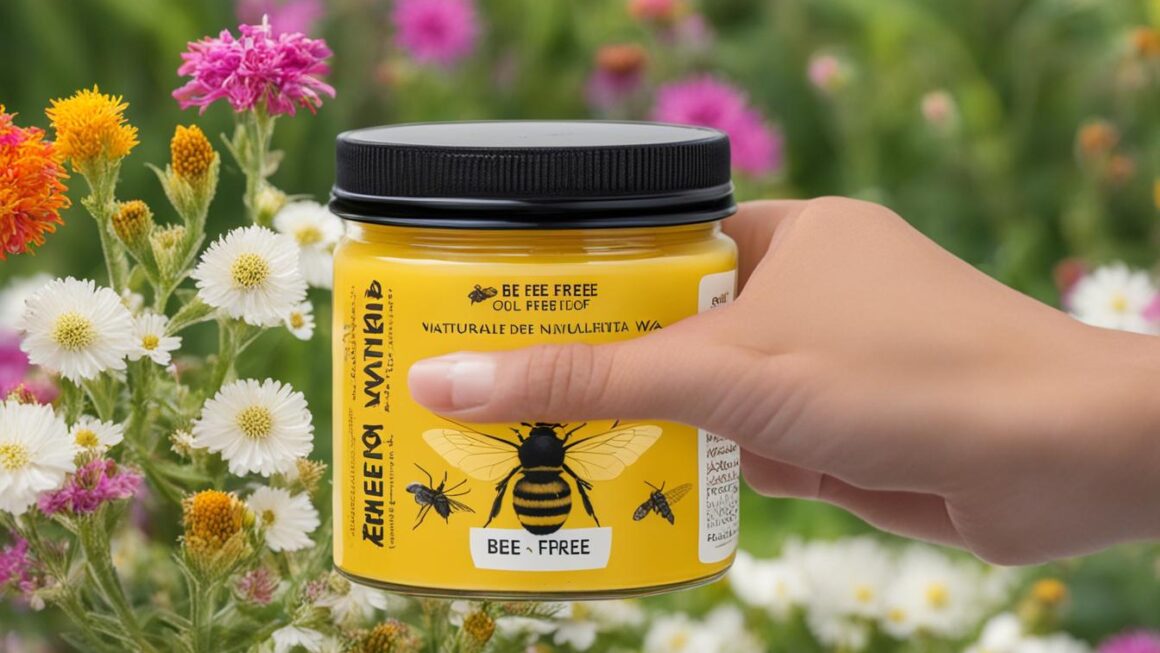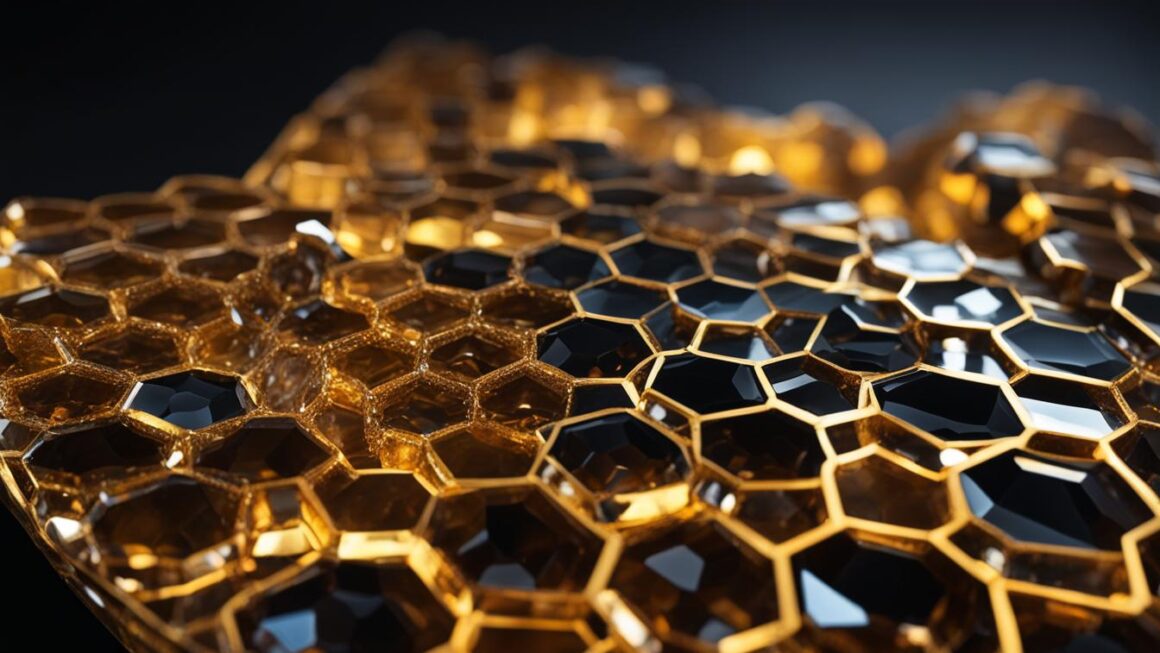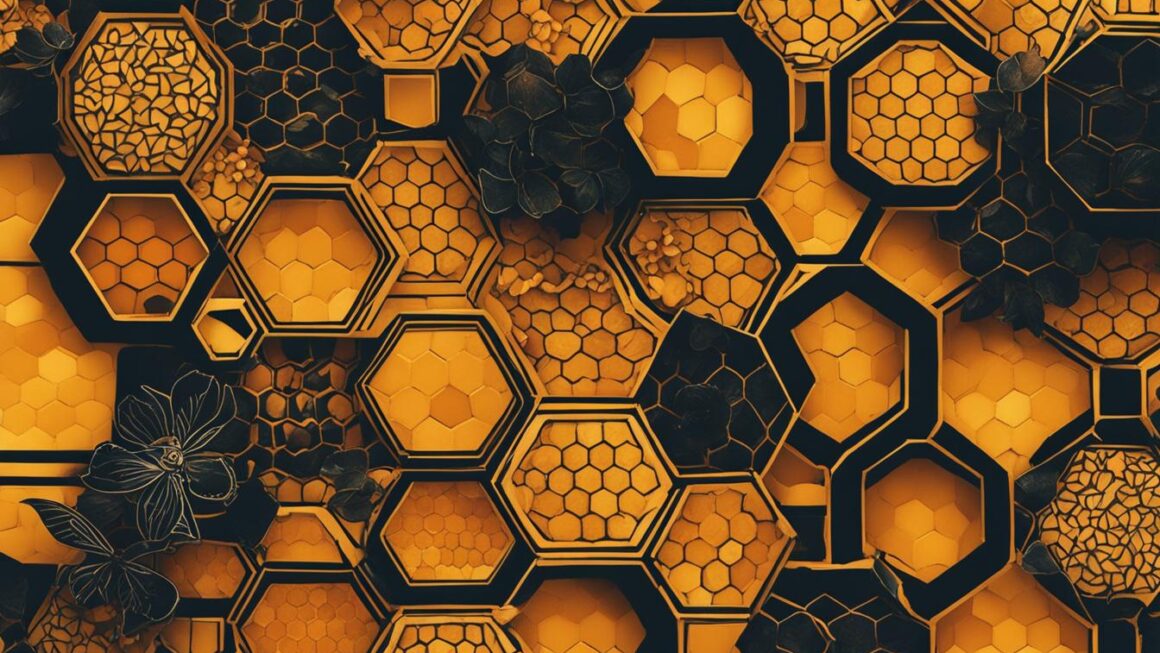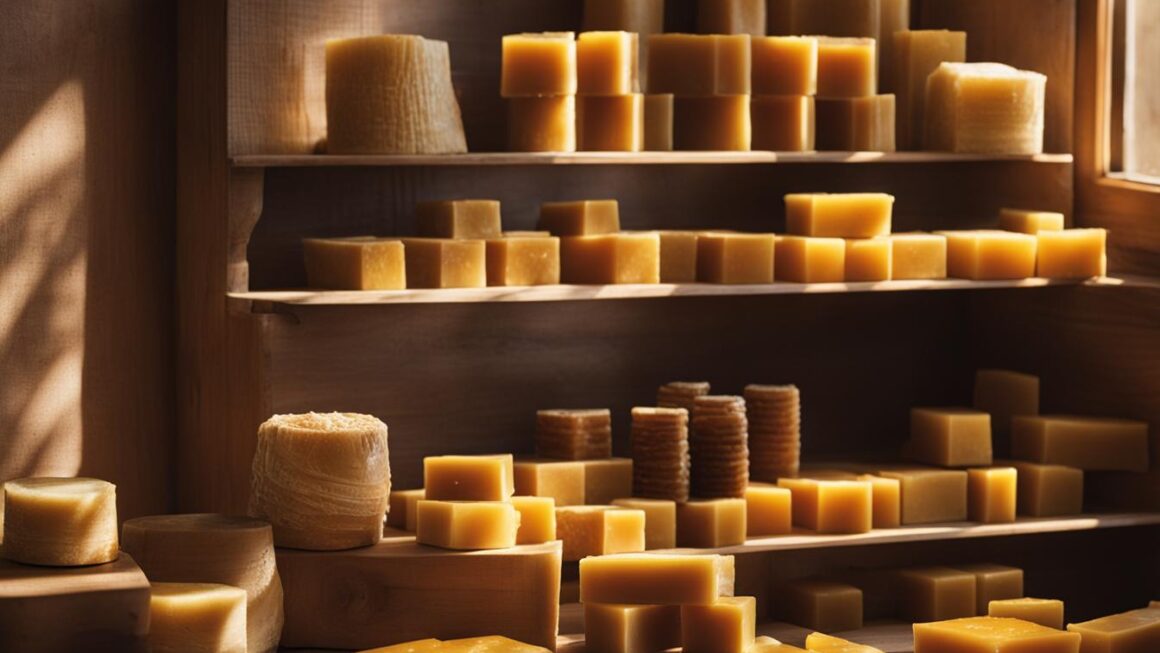Beeswax is a popular ingredient in cosmetics and skincare products, known for its various benefits. However, if you follow a vegan lifestyle or prefer eco-friendly options, you may be looking for alternatives to beeswax. The good news is that there are many vegan wax alternatives available that offer similar properties and can be used as a substitute for beeswax.
Key Takeaways:
- There are numerous alternatives to beeswax, including eco-friendly, vegan, and synthetic options.
- Vegan wax alternatives are derived from plant-based sources like soy, candelilla, and carnauba wax.
- Synthetic waxes are created through chemical processes and offer similar properties to beeswax.
- Choosing the right alternative depends on your needs, preferences, and the specific application of the wax.
- By opting for vegan and eco-friendly wax alternatives, you can support cruelty-free and sustainable practices in the beauty industry.
Is Beeswax Vegan?
Beeswax is a common ingredient in cosmetics and skincare products, known for its moisturizing and protective properties. However, when it comes to vegan-friendly cosmetics, beeswax is not considered suitable. Is beeswax vegan? The answer lies in its extraction process and its impact on bees’ health.
Beeswax is derived from honeycomb, which bees create to store food and larvae. To obtain beeswax, beekeepers remove the honeycomb from beehives. While this process may seem harmless at first, it can be seen as exploitative and harmful to bees. Harvesting beeswax disrupts the bees’ natural behavior and can potentially affect their overall health and well-being.
For those following a vegan lifestyle, the extraction process of beeswax raises ethical concerns. Veganism is centered around avoiding the exploitation and harm of animals, and bees are no exception. Therefore, many individuals who choose to follow a vegan lifestyle opt for vegan-friendly cosmetics that do not contain beeswax or any other animal-derived ingredients.
What’s Up With Vegan Wax?
The cosmetics industry has made significant strides in developing vegan wax alternatives to replace beeswax in various cosmetic formulas. These alternatives can be categorized into natural waxes, derived from plant oils, and pseudo-waxes, which are blends of oils and hydrogenated oils. It is important for consumers to be aware of the INCI (International Nomenclature of Cosmetic Ingredients) names listed on cosmetic packaging to determine if a product is truly vegan-friendly.
Natural waxes are obtained from plant sources and offer a sustainable and vegan alternative to beeswax. Some common examples include:
- Candelilla wax: Derived from the candelilla shrub, it has a similar texture to beeswax and is often used in lip balms and creams.
- Berry wax: Extracted from lacquer tree berries, it provides a jelly-like structure and is used in various cosmetic products.
- Myrica fruit wax: Derived from the myrica berry bush, it adds texture and body to skincare formulations.
- Rice bran wax: Made from rice bran, it helps retain moisture and is commonly used in lip balms and lotions.
- Sunflower wax: Derived from dewaxed sunflower oil, it offers a non-sticky skin feel and is used in various skincare products.
Pseudo-waxes are blends of oils and hydrogenated oils that mimic the properties of beeswax. They are often used as vegan alternatives in cosmetic products. Some examples include:
- Olive oil esters: Derived from olive oil, they provide emollient properties and enhance the texture of skincare products.
- Jojoba esters: Obtained from jojoba oil, these esters offer moisturizing benefits and improve the stability of cosmetic formulas.
- Squalane: Derived from plant sources such as sugar cane or olives, it has similar properties to beeswax and is commonly used in skincare products.
By opting for vegan wax alternatives, consumers can support cruelty-free and sustainable practices in the beauty industry while still enjoying the benefits of natural ingredients. It is essential to read and understand the INCI names listed on product packaging to ensure that the chosen products are truly vegan-friendly.
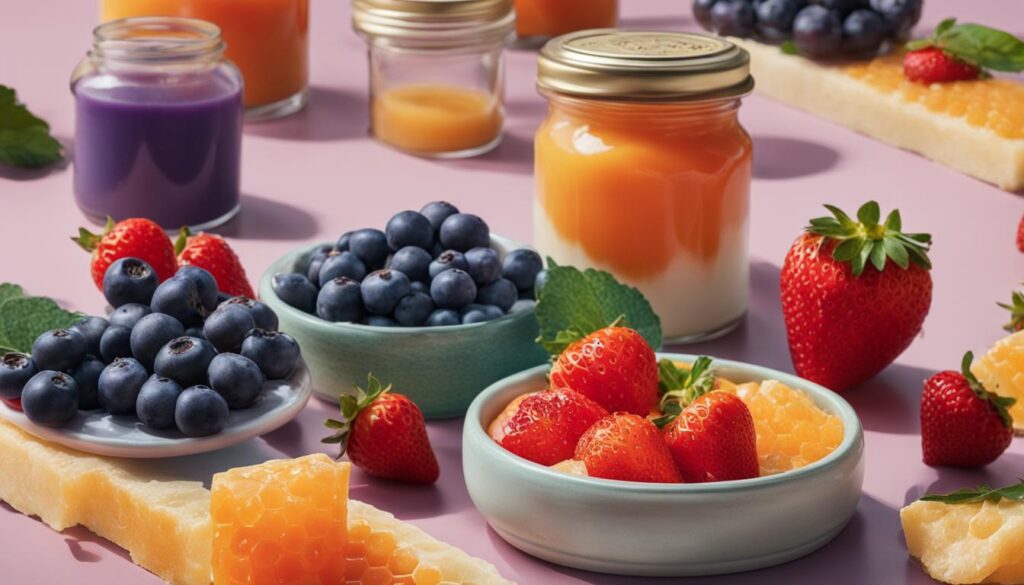
Table: Comparison of Natural and Pseudo-waxes
| Wax Type | Source | Texture | Common Use |
|---|---|---|---|
| Candelilla wax | Candelilla shrub | Similar to beeswax | Lip balms, creams |
| Berry wax | Lacquer tree berries | Jelly-like | Cosmetic products |
| Myrica fruit wax | Myrica berry bush | Texture enhancing | Skincare formulations |
| Rice bran wax | Rice bran | Moisturizing | Lip balms, lotions |
| Sunflower wax | Dewaxed sunflower oil | Non-sticky | Skincare products |
| Olive oil esters | Olive oil | Emollient | Skincare products |
| Jojoba esters | Jojoba oil | Moisturizing | Cosmetic formulas |
| Squalane | Plant sources (sugar cane or olives) | Similar to beeswax | Skincare products |
The Best Vegan Alternatives for Beeswax
If you’re looking for vegan alternatives to beeswax in your skincare and cosmetic products, you’re in luck. There are several options available that provide similar benefits and textures. Let’s explore some of the best vegan alternatives for beeswax:
Candelilla Wax
Candelilla wax is derived from the candelilla shrub, which is native to northern Mexico. It has a texture similar to beeswax and is commonly used in lip balms, creams, and lotions. Candelilla wax helps to provide structure and hardness to products while imparting a smooth and silky feel to the skin.
Berry Wax
Berry wax is extracted from the berries of the lacquer tree. It has a jelly-like structure and is often used in lip balms, lipsticks, and other cosmetic products. Berry wax adds a luxurious texture to formulations and helps to lock in moisture, keeping your lips and skin hydrated.
Myrica Fruit Wax
Derived from the myrica berry bush, myrica fruit wax is a vegan alternative that adds texture and body to products. It is commonly used in lip balms, lipsticks, and creams. Myrica fruit wax helps to create a smooth and creamy consistency while providing nourishing properties for the skin.
Rice Bran Wax
Rice bran wax is made from rice bran, which is a byproduct of rice production. It is often used in cosmetics and skincare products as a vegan alternative to beeswax. Rice bran wax helps to retain moisture in the skin, leaving it soft and hydrated.
Sunflower Wax
Sunflower wax is derived from dewaxed sunflower oil and is a sustainable and vegan alternative to beeswax. It has a non-sticky skin feel and is often used in lip balms, lotions, and creams. Sunflower wax helps to create a smooth and silky texture while providing moisturizing benefits for the skin.
These vegan alternatives to beeswax offer a wide range of options for formulators and consumers looking for plant-based alternatives. Whether you’re vegan, environmentally conscious, or simply prefer to avoid animal-derived ingredients, these alternatives provide excellent alternatives that are both effective and sustainable.
Beeswax Alternative You Should Avoid
When searching for vegan alternatives to beeswax, carnauba wax often comes up as a popular option. However, there are some health hazards and ecological concerns associated with this wax that make it an alternative best to avoid.
Research has shown that carnauba wax can cause health hazards such as eye irritation and allergic reactions when used in certain cosmetic products. These reactions can be particularly concerning for individuals with sensitive skin or preexisting allergies. It is important to be aware of these potential risks when considering carnauba wax as a substitute for beeswax.
In addition to health hazards, there are ecological concerns associated with the harvesting of carnauba wax. This wax is derived from the leaves of the Brazilian palm tree, known as Copernicia prunifera. The process of obtaining carnauba wax involves removing the leaves, which can stunt the tree’s growth and harm the surrounding ecosystem.
“The harvesting of carnauba wax can have significant negative impacts on the environment, particularly in regions where palm trees are prevalent. It is crucial for consumers to be aware of the ecological consequences associated with this wax and consider more sustainable alternatives.”
Considering the health hazards and ecological concerns associated with carnauba wax, it is advisable to explore other vegan alternatives for beeswax. By choosing alternative waxes that are both safe and sustainable, you can make more informed and environmentally conscious choices for your skincare and cosmetic products.
| Beeswax Alternatives | Health Hazards | Ecological Concerns |
|---|---|---|
| Candelilla Wax | No health hazards reported | No ecological concerns reported |
| Berry Wax | No health hazards reported | No ecological concerns reported |
| Myrica Fruit Wax | No health hazards reported | No ecological concerns reported |
| Rice Bran Wax | No health hazards reported | No ecological concerns reported |
| Sunflower Wax | No health hazards reported | No ecological concerns reported |
| Carnauba Wax | Health hazards reported | Ecological concerns reported |
Table: Beeswax Alternatives – Health Hazards and Ecological Concerns
Skin Benefits of Beeswax
Beeswax is renowned for its numerous benefits for the skin. Its protective properties create a barrier that shields the skin from environmental contaminants, such as dirt and pollutants. This barrier not only helps in preventing these harmful substances from causing damage to the skin but also aids in retaining moisture, resulting in hydrated and supple skin.
Additionally, beeswax acts as a humectant, attracting and retaining moisture in the skin. This makes it an excellent ingredient for dry and dehydrated skin types, as it helps lock in moisture and prevent transepidermal water loss.
Moreover, beeswax possesses natural antibacterial properties. It helps keep the skin clean and reduces the risk of microbial infections, making it particularly beneficial for individuals with acne-prone or sensitive skin.
“Beeswax is a versatile ingredient that offers multiple benefits for the skin, including protection, hydration, and antibacterial properties.”
In addition to its protective and humectant properties, beeswax is a rich source of vitamin A. This essential vitamin promotes cell turnover, helping to rejuvenate the skin and improve its elasticity. It also contributes to the overall health and appearance of the skin, aiding in reducing the signs of aging, such as fine lines and wrinkles.
Furthermore, beeswax exhibits anti-inflammatory properties, which can help soothe and calm irritated or inflamed skin. It can be particularly useful in alleviating discomfort caused by sunburns, minor burns, and skin conditions like eczema and psoriasis.
| Benefits of Beeswax for Skin |
|---|
| Protective properties |
| Humectant (moisture-retaining) properties |
| Antibacterial properties |
| Rich in vitamin A |
| Anti-inflammatory properties |
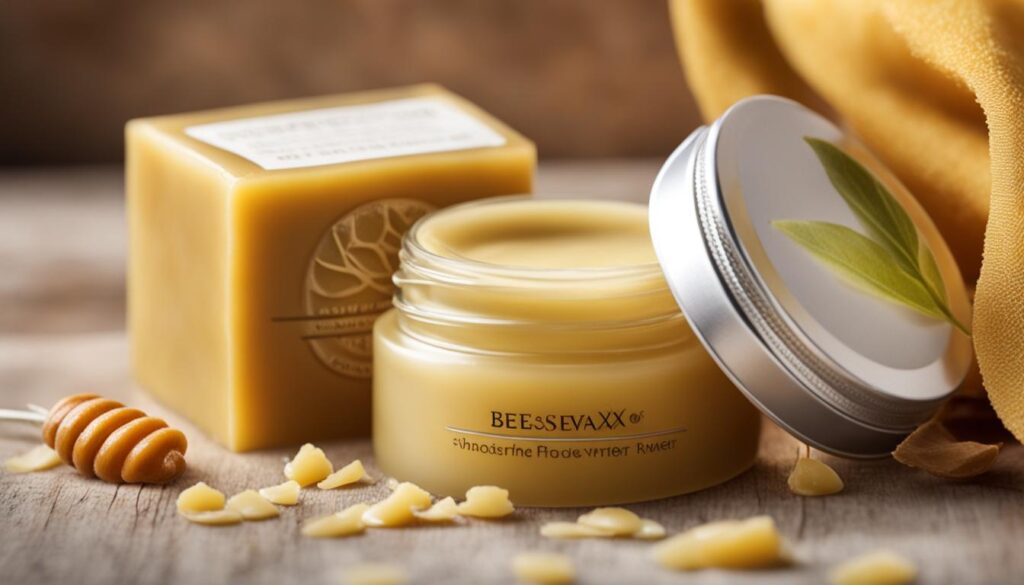
Overall, beeswax is a versatile ingredient that offers multiple benefits for the skin. It provides protection, hydration, and antibacterial benefits, while also promoting cell turnover and soothing inflammation. Incorporating beeswax into skincare products can be a valuable addition to any skincare routine, helping to achieve healthy, radiant skin.
How to Use Beeswax in Skincare Products
Beeswax is a versatile ingredient that can be incorporated into a variety of skincare products to provide texture and beneficial properties. Whether you’re making lip balms, ointments, lotion bars, or body butter, beeswax can enhance the effectiveness and skin feel of your creations. Here are some tips on how to use beeswax in your skincare formulations.
Making Lip Balms
Lip balms are a popular product for moisturizing and protecting the delicate skin of the lips. Beeswax is an essential ingredient in lip balms as it adds hardness and stability to the formula, preventing the balm from melting or becoming too soft. To make a simple beeswax lip balm, melt together beeswax, a nourishing oil like coconut or almond oil, and a few drops of your favorite essential oil for fragrance. Pour the mixture into small lip balm containers and let it cool and solidify.
Creating Ointments
Ointments are often used for soothing and healing purposes, such as treating dry skin, minor cuts, and burns. Beeswax can help create a protective barrier on the skin, allowing it to retain moisture and promote healing. To make an ointment, melt together beeswax, a healing oil like olive or jojoba oil, and any additional ingredients like herbal extracts or essential oils. Once melted and combined, pour the mixture into jars or tins and let it cool completely before use.
Formulating Lotion Bars and Body Butter
Lotion bars and body butters are solid moisturizers that melt upon contact with the warmth of the skin, providing intense hydration. Beeswax is a key ingredient in these products as it helps them retain their shape and prevents them from melting too quickly. To make a lotion bar or body butter, melt together beeswax, nourishing butters like shea or cocoa butter, and moisturizing oils like coconut or avocado oil. Once melted and thoroughly mixed, pour the mixture into molds or containers and allow it to cool and solidify.
Using beeswax in skincare products not only adds texture and stability but also provides beneficial properties for the skin. Its natural emollient and humectant properties help lock in moisture and protect the skin from dryness. Additionally, beeswax has anti-inflammatory and antibacterial properties, making it suitable for soothing and healing purposes. So, get creative and start incorporating beeswax into your skincare formulations for beautiful, nourished skin.
DIY Recipes with Vegan Wax Alternatives
With the availability of vegan wax alternatives, you can now create your own DIY skincare products that are both eco-friendly and cruelty-free. These recipes allow you to customize your products to suit your preferences and ensure that they align with your vegan lifestyle. Here are two simple and effective DIY recipes using vegan wax alternatives:
Vegan Lip Balm Recipe
This vegan lip balm recipe is perfect for keeping your lips moisturized and protected throughout the day. It uses candelilla wax as a vegan alternative to beeswax. Here’s what you’ll need:
- 1 tablespoon candelilla wax
- 2 tablespoons coconut oil
- 10-15 drops of your favorite essential oil (such as peppermint or lavender) for fragrance
To make the lip balm, start by melting the candelilla wax and coconut oil together in a double boiler. Once melted, remove from heat and stir in the essential oil. Pour the mixture into small containers or lip balm tubes and let it cool and solidify. Your DIY vegan lip balm is now ready to use!
Vegan Lotion Bar Recipe
If you prefer a solid moisturizer that you can easily apply to your skin, try making this vegan lotion bar. It incorporates rice bran wax as a vegan alternative to beeswax. Here’s what you’ll need:
- 1/4 cup shea butter
- 1/4 cup cocoa butter
- 1/4 cup rice bran wax
- 10-15 drops of your favorite essential oil (such as lavender or chamomile) for a soothing fragrance
To make the lotion bar, start by melting the shea butter, cocoa butter, and rice bran wax in a double boiler. Once melted, remove from heat and stir in the essential oil. Pour the mixture into a mold or silicone ice cube tray and let it cool and harden. You can then use the lotion bar by simply rubbing it onto your skin, allowing the natural body heat to melt the moisturizing ingredients.
These DIY recipes with vegan wax alternatives are just a starting point. Feel free to experiment with different ingredients, proportions, and essential oils to create personalized skincare products that suit your needs and preferences. By making your own products, you have full control over the ingredients and can ensure that they are vegan-friendly, eco-friendly, and free from any unwanted chemicals or additives.
Benefits of Using Vegan Wax Alternatives
Choosing vegan wax alternatives offers a range of benefits for those looking for cruelty-free skincare options and eco-friendly choices. By opting for these alternatives, you can support ethical practices in the beauty industry while still enjoying the benefits of natural and sustainable ingredients.
Vegan wax alternatives are derived from plants, making them a more environmentally conscious option compared to traditional beeswax. These alternatives are often made from plant oils, such as candelilla wax, berry wax, myrica fruit wax, rice bran wax, and sunflower wax. By using vegan wax alternatives, you reduce your reliance on animal by-products and contribute to the reduction of animal exploitation.
Furthermore, choosing vegan wax alternatives allows you to enjoy the benefits of cruelty-free skincare. These alternatives are not tested on animals, making them a more compassionate choice. They are also free from any animal-derived ingredients, including beeswax, ensuring that your skincare routine aligns with your values.
Additionally, vegan wax alternatives are often produced using sustainable practices. Many of these alternatives are sourced from renewable plant resources, ensuring that the ingredients are grown and harvested in a way that minimizes the impact on the environment. This makes vegan wax alternatives a great choice for those who prioritize sustainability and want to minimize their ecological footprint.
Benefits at a Glance
- Cruelty-free skincare
- Eco-friendly and sustainable choices
- Derived from renewable plant resources
- Reduces reliance on animal by-products
- Supports ethical practices in the beauty industry
Incorporating vegan wax alternatives into your skincare routine allows you to make a positive impact on the environment and support companies that prioritize ethical practices. By choosing cruelty-free and eco-friendly options, you can enjoy beautiful skin while staying true to your values.
Incorporating Vegan Wax Alternatives into Your Skincare Routine
As more people embrace vegan lifestyles and seek cruelty-free skincare options, incorporating vegan wax alternatives into your skincare routine is a smart choice. To ensure you’re choosing truly vegan-friendly products, it’s important to read ingredient labels and familiarize yourself with the International Nomenclature of Cosmetic Ingredients (INCI) names.
Reading ingredient labels: When shopping for skincare products, take the time to read the ingredient labels carefully. Look for keywords like “candelilla wax,” “berry wax,” “myrica fruit wax,” “rice bran wax,” or “sunflower wax” as these are vegan alternatives to beeswax. Avoid products that list “beeswax” or “cera alba” in their ingredient lists.
Understanding INCI names: INCI names are globally recognized names for cosmetic ingredients. By familiarizing yourself with these names, you can quickly identify vegan-friendly products. For example, candelilla wax has the INCI name “euphorbia cerifera (candelilla) wax,” while rice bran wax is listed as “oryza sativa (rice) bran wax.” Make a note of the INCI names of your preferred vegan wax alternatives so that you can spot them easily in the future.
Choosing vegan-friendly products: By incorporating vegan wax alternatives into your skincare routine, you can enjoy the benefits of natural ingredients without compromising your ethical beliefs. Look for products that clearly state they are vegan-friendly or cruelty-free. Many brands now proudly display certifications such as the Leaping Bunny logo or the Vegan Society’s Vegan Trademark on their packaging, making it easier for consumers to make informed choices.
By taking the time to read ingredient labels and familiarize yourself with INCI names, you can confidently incorporate vegan wax alternatives into your skincare routine. Embrace cruelty-free and sustainable practices while still enjoying the benefits of natural ingredients.
Conclusion
In conclusion, when it comes to finding vegan alternatives to beeswax, there are plenty of options available that allow you to make eco-friendly choices for your skincare and cosmetic products. Whether you’re looking for a plant-based wax, a synthetic wax, or a combination of oils, there are alternatives that offer similar benefits and textures to beeswax.
By opting for vegan wax alternatives, you can support cruelty-free and sustainable practices in the beauty industry. These alternatives are derived from plants and have a minimal impact on wildlife, making them a more environmentally conscious choice.
So, if you’re following a vegan lifestyle or simply looking for more ethical and eco-friendly options, consider incorporating vegan alternatives to beeswax into your skincare routine. By doing so, you can enjoy the benefits of natural ingredients while making choices that align with your values.
FAQ
Is beeswax vegan?
No, beeswax is not considered vegan as it is derived from honeycomb created by bees.
What are vegan wax alternatives?
Vegan wax alternatives are plant-based waxes or blends of oils and hydrogenated oils used as substitutes for beeswax in cosmetic products.
How can I determine if a product is vegan-friendly?
Look for the INCI names on cosmetic packaging to determine if a product is truly vegan-friendly.
What are the best vegan alternatives to beeswax?
Some of the best vegan alternatives to beeswax include candelilla wax, berry wax, myrica fruit wax, rice bran wax, and sunflower wax.
Why should I avoid carnauba wax as a vegan alternative?
Carnauba wax can cause health hazards and has negative ecological impacts due to the harvesting process.
What are the skin benefits of beeswax?
Beeswax offers protective properties, humectant properties, antibacterial properties, vitamin A content, and anti-inflammatory properties.
How is beeswax used in skincare products?
Beeswax is commonly used in lip balms, ointments, lotion bars, and body butter to provide hardness and texture.
Can I make DIY skincare products using vegan wax alternatives?
Yes, you can make vegan lip balm using alternatives like candelilla wax and coconut oil, or a vegan lotion bar using shea butter, cocoa butter, and rice bran wax.
What are the benefits of using vegan wax alternatives?
Using vegan wax alternatives allows you to support cruelty-free skincare and make eco-friendly and sustainable choices for the environment.
How can I incorporate vegan wax alternatives into my skincare routine?
Read ingredient labels and look for the INCI names of wax alternatives to ensure that the products you choose are truly vegan-friendly.
What is the conclusion about vegan alternatives to beeswax?
Vegan alternatives to beeswax provide similar benefits and allow you to make eco-friendly choices while still enjoying the benefits of natural skincare ingredients.

